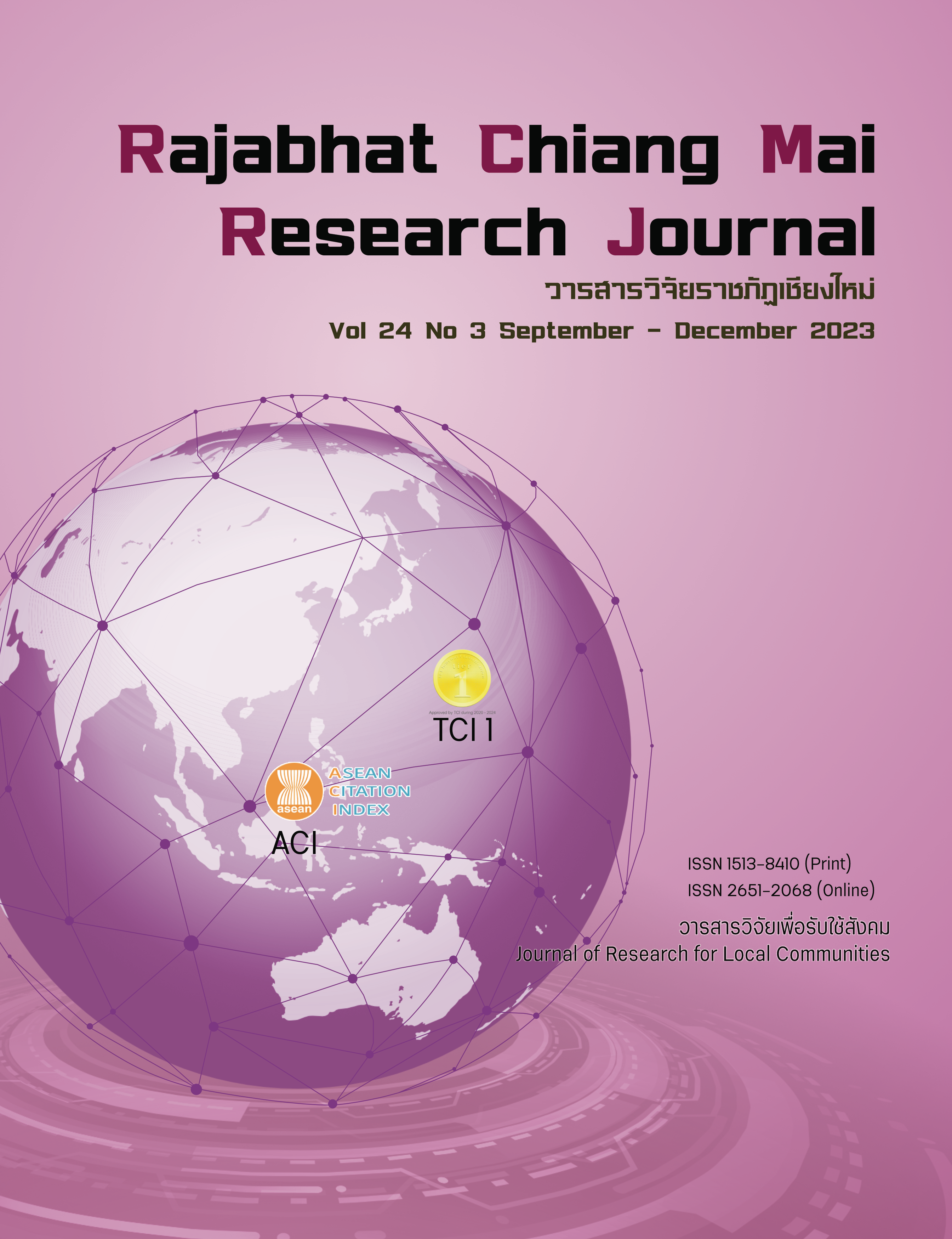Role of Hundi in Border Trade Payment of Northern Thailand- Myanmar Before and After 2021 Military Coup
DOI:
https://doi.org/10.57260/rcmrj.2023.265145คำสำคัญ:
Border trade, Informal trade, Informal payment, Hundi, Thailand-myanmar, Northern thailand, Military coupบทคัดย่อ
Myanmar considers border trade more important than international trade. Due to the economic sanctions imposed by the West since the military government took power in 1996 up until the latest one in 2021, Thailand -Myanmar border trade has been characterized by more informal trade than previously. Border trade has developed despite being subjected to long-standing international trade barriers.
This study aims to convey an understanding of how the informal border payment, “Hundi”, works as the border-trade -payment between Myanmar and Northern Thailand. Even though hundi is an informal transfer system it is widely used as an alternative banking system. Especially, hundi is used in the financing of legitimate businesses, to prevent exacerbating the problems of access to credit of different states. This study draws on available literature and open-source reporting, as well as extensive field research by interviewing trusted sources for more than 30 informants (i.e., border-trader, money changer, money transfer operators, business leaders, hundi operators, immigrant labors, government officials, commercial banking staffs) in the northern part of Thailand with the border city in Shan state, Myanmar during 2017-2022.
This study found that hundi plays a significant role as both a substitute and complement to cross-border trade and payment across the border of Myanmar-Thailand. After the recent political instability, and expansion from a formal banking sector to a mobile money services, in the short term, we are unlikely to see an elimination of the hundi system completely.
Downloads
เอกสารอ้างอิง
Adams Jr., R. H., & Page, J. (2005). Do international migration and remittances reduce poverty in developing countries?. World Development, 33(10), 1645-1669. https://doi.org/10.1016/j.worlddev.2005.05.004
Aung, W. S. (2011). Informal Trade and Underground Economy in Myanmar: Costs and Benefits. Bangoko: IRASEC.
Deelan, L., & Vasuprasat, P. (2009). Migrant Workers’ Remittances from Thailand to Cambodia, Lao PDR and Myanmar : Synthesis Report on Survey Findings in Three Countries and Good Practices. ILO/Japan Project on Managing Cross-border Movement of Labour in Southeast Asia Regional Office for Asia and the Pacific.
Dixit, A. K. (2004). Lawlessness and Economics: Alternative Modes of Governance. Princeton: Princeton University Press.
Dixit, A. K. (2007). Lawlessness and Economics: Alternative Modes of Governance. Princeton University Press.
Downing, J., & Mon, S. (2017, March 6). frontiermyanmar. Retrieved from https://www.frontiermyanmar.net/en/transactions-of-trust-and-faith/
El Qorchi, M., Munzele Maimbo, S., & Wilson, J. F. (2003, November 18). Informal Funds Transfer Systems: An Analysis of the Informal Hawala System.
Eleven Media Gruop. (2023, March 4). Mahar Aung Myay Township, Mandalay, Myanmar. Retrieved from https://elevenmyanmar.com/news/central-bank-of-myanmarthe-use-of-thai-baht-and-myanmar-kyat-for-direct-payment-at-myanmar-thai
Hall, A. (2012). Myanmar and Migrant Workers: Briefing and Recommendations. Mahidol Migration Centre.
Hariharan , A. (2012). Hawala's Charm: What Banks Can Learn F s Charm: What Banks Can Learn From Informal F om Informal Funds Transfer Systems . William & Mary Business Law Review, 3(1), 273-308. https://scholarship.law.wm.edu/wmblr/vol3/iss1/8
Ismail , A. A. (2007). Lawlessness and economic governance: the case of hawala system in Somalia. International Journal of Development Issues, 6, 168-185. DOI:10.1108/14468950710843415
Kubo, K. (2015). Evolving Informal Remittance Methods of Myanmar Migrant Workers in Thailand. Institute of Developing Economies.
Maimbo, S. M., El Qorchi, M., & Wilson, J. F. (2003). Informal Funds Transfer Systems: An Analysis of the Informal Hawala System. Washington: International Monetary Fund.
NikkeiAsia. (2023, January 19). MYANMAR CRISIS. Retrieved from https://asia.nikkei.com/Spotlight/Myanmar-Crisis/Myanmar-embraces-mobile-payments-under-military-rule
Panthamit, N. (2016). Liberal economy and northern border trade, Border trade in Mae Sai District. 71-73.
Rahimi, H. (2020). Hawala as credit: recognizing how hawala supports the business climate in Afghanistan. Journal of Money Laundering Control , 23(1), 224-244. https://doi.org/10.1108/JMLC-07-2019-0053
Raza, M. S., Fayyaz, M., & Ijaz, H. (2017). The hawala system in Pakistan: a catalyst for money laundering & terrorist financing. Forensic Research & Criminology International Journal, 5(4), 367-369. DOI: 10.15406/frcij.2017.05.00167
Rest of World. (2021). Labor. Retrieved from https://restofworld.org/labor/
Reuters. (2021, October 1). Myanmar currency trade turns to online groups on Facebook amid crisis. Retrieved from https://www.reuters.com/world/asia-pacific/myanmars-economic-crisis-fuels-underground-currency-trading-2021-10-01/
Sandar, M. (2011). Study of Factors Influencing Remittances of Myanmar Migrants (Case Study in Samut Sakhon, Thailand). Vahu Development Institute.
Shanmugam, B. (2004). Hawala and money laundering: a Malaysian perspective. Journal of Money Laundering Control, 8(1), 34-47. https://doi.org/10.1108/13685200510621181
Thompson , R. (2019). Underground banking” and Myanmar’s changing hundi system. Journal of Money Laundering Control, 22(2), 339-349. DOI:10.1108/JMLC-04-2018-0030
Tual , S. (2021). Bangkok Post. Retrieved from Bangkok Post: https://www.bangkokpost.com/opinion/opinion/2197015/migrants-face-red-tape-nightmare.
Turnell, S., Vicary, A., & Bradford, W. (2010). Migrant Worker Remittances and Burma: An Economic Analysis of Survey Results. Burma Economic Watch Macquarie University.
Viles , T. (2008). Hawala, hysteria and hegemony. Journal of Money Laundering Control, 11(1), 25-33. https://doi.org/10.1108/13685200810844479
Wang, J. R. (2011). Regulating Hawala: a comparison of five national approaches. Journal of Money Laundering Control, 14(3), 210-224. https://www.prio.org/publications/4890
World Bank. (2003). The Money Exchange Dealers of Kabul: A Study of the Hawala System in Afghanistan. World Bank Working Paper, 13. Washington , D.C.
World Bank. (2012). Borderless bazaars and regional integration in Central Asia emerging patterns of trade and cross-border cooperation. The World Bank. Washington , D.C.
World Bank. (2018). The Market for Remittance Services in Southern Africa. Washington, DC, United State of America.
Zagaris, B. (2007). Problems applying traditional anti‐money laundering procedures to non‐financial transactions, “parallel banking systems” and Islamic financial systems. Journal of Money Laundering Control, 10(2), 157-169. doi:10.1108/13685200710746866
ดาวน์โหลด
เผยแพร่แล้ว
รูปแบบการอ้างอิง
ฉบับ
ประเภทบทความ
สัญญาอนุญาต
ลิขสิทธิ์ (c) 2023 วารสารวิจัยราชภัฏเชียงใหม่

อนุญาตภายใต้เงื่อนไข Creative Commons Attribution-NonCommercial-NoDerivatives 4.0 International License.
1. บทความ ข้อมูล เนื้อหา รูปภาพ ฯลฯ ที่ได้รับการตีพิมพ์ใน “Community and Social Development Journal” ถือเป็นลิขสิทธิ์ของ Community and Social Development Journal มหาวิทยาลัยราชภัฏเชียงใหม่ และเพื่อให้เผยแพร่บทความได้อย่างเหมาะสมผ่านสื่อสิ่งพิมพ์และอิเล็กทรอนิกส์ ผู้เขียนยังคงถือครองลิขสิทธิ์บทความที่ตีพิมพ์ภายใต้ใบอนุญาต Creative Commons Attribution (CC BY) ซึ่งอนุญาตให้เผยแพร่บทความซ้ำในแหล่งอื่นได้ โดยอ้างอิงต้องอ้งอิงบทความในวารสาร ผู้เขียนต้องรับผิดชอบในการขออนุญาตผลิตซ้ำเนื้อหาที่มีลิขสิทธิ์จากแหล่งอื่น
2. เนื้อหาบทความที่ปรากฏในวารสารเป็นความรับผิดชอบของผู้เขียนบทความโดยตรง ซึ่งกองบรรณาธิการวารสารไม่จำเป็นต้องเห็นด้วยหรือร่วมรับผิดชอบใดๆ














